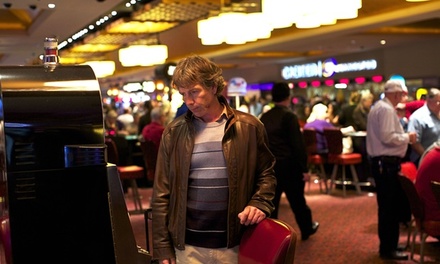Depictions of gambling addiction are often hard for this viewer to stomach. I've walked past an empty craps table and felt the pull of the dice, and I've stayed at blackjack tables past the point where I'm having any fun. Short of some ironclad financial discipline, I can imagine a scenario where a weakness for the instant gratification that gambling can provide takes an ugly turn. Seeing exactly that happen onscreen hits close to home. Mississippi Grind captures the highs of gambling, rushes so powerful that everything else slips away and possessing the means to recreate it becomes more important than dignity or shame. It also captures the crushing feeling of the bad beat, and the intense self-loathing that goes along with it. Anna Boden's and Ryan Fleck's fourth collaboration, and their second about some kind of dependency, is one of the best depictions of gambling I've ever come across, while also bringing the kind of emotional honesty that I've come to expect from their work.
Once on the road, the degenerate duo proceed with their plans to varied results. St. Louis proves a bonanza, as Gerry takes down a riverboat game in the kind of realistic hands that seldom make their way into cinematic representations of poker (looking at you, Casino Royale). While Gerry plays, Curtis gets reacquainted with his on-off escort girlfriend Simone (Sienna Miller), who brings a friend (Annaleigh Tipton) for Gerry. Curtis and Simone's relationship is only hinted at, but it's apparent that they've known each other for a long time. Tipton's character, Vanessa, spends a chaste and charming evening with Gerry, partaking in magic tricks, piano playing, and honest conversation, deepening the reservoir of goodwill towards him. In Memphis, Gerry's luck takes a turn after a longshot bad beat, putting the trip at risk. In classic problem gambler fashion, stopping is never an option, and Gerry just gets more desperate to get to the big New Orleans game, which will surely turn it all around. Earlier, in St. Louis, Simone asks Curtis why this companion is different from all the ones before. Based on his eventual behavior, she was right to be skeptical of Gerry.
Boden and Fleck's film relies on some pretty repulsive behavior to power its plot engine, and therefore requires an amount of audience buy-in to the characters, lest they suffer a repeat of Mark Wahlberg's The Gambler and end up rooting against the protagonist. To that end, they couldn't have cast this film better. Mendelsohn's Gerry has a serious problem that manifests itself in theft, but there's a sadness in his eyes that keeps him sympathetic. Mendelsohn goes full sad-sack here, with plenty of shame etched into his craggy face. On the multiple occasions where Gerry is lying or stealing, it elicits a sigh from the viewer instead of a scowl. Reynolds isn't far off from his baseline persona, but it's finely calibrated and naturalistic in a way I've never seen him before. His Curtis loves people, and wants to know everything about everyone he runs into. Never condescending, he's the best role Reynolds has had in his career. He and Mendelsohn complement each other nicely, in good times and bad.
The research period for Mississippi Grind must have been fun, because Boden and Fleck get gambling as well as anyone. The thrilling highs and devastating lows are depicted with equal accuracy. The hot feeling of shock that comes from a loss washes over Mendelsohn's face more than once, but the ecstasy of an unstoppable run, where probability fades away and the exact right card or roll comes every time, makes it clear why some people cannot help but keep coming back. All that Gerry has left is a belief in magic, that the universe is talking directly to him. He's been cursed by being forced to listen all the time. Mississippi Grind is that rare film about addiction that makes the viewer want to engage in the negative behavior onscreen, because it nails the allure. What else is cinema for than to transport the viewer into something they can't, won't, or shouldn't experience?

 RSS Feed
RSS Feed